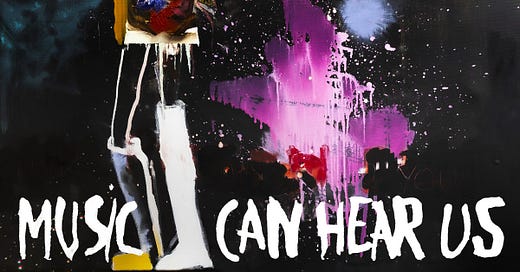For DJ Koze, All the World's a Playground
The latest album from the German producer is a pancultural pop opus, playful and frequently sublime.
DJ Koze - Music Can Hear Us
For a moment, DJ Koze seemed poised for stardom. A 2023 team-up with the singer Róisin Murphy was deliberately positioned as a star-making foray into club music with populist appeal— it even bore the title Hit Parade, seemingly without irony. The title was not to be a self-fulfilling prophecy— when ignominious comments resurfaced on Murphy’s Facebook page, the project was all but buried, Koze’s superstar prospects along with it
There’s no Murphy on Music Can Hear Us, the latest DJ Koze affair— nor are there many obvious gestures toward the mainstream. Yet in its own way, this feels like a pop breakthrough more perfect than any crossover collaboration— or at least more calibrated to Koze’s guileless, childlike sensibility. Across more than an hour, Music Can Hear Us revels in rhythm, melody, and the sensual pleasures of the human voice— resulting in a pop confection of dazzling reach, unerring tunefulness, and tremendous appeal.
The record opens with a bit of a brain-cleanser— an eight-minute meditation called “The Universe in a Nutshell,” featuring a few recited lines from Rumi followed by the quiet glow of harp, keys, and wordless chant. If it’s meant to dissolve any of the listener’s lingering biases or preconceived categories, it works— making it the perfect front door into the wild and wonderful world of DJ Koze, where global citizenship and regional pride are both givens. Without ever veering into corniness or “world music” cliche, Music Can Hear Us is expansive in its panculturalism— moving nimbly from rumbling afrobeat (“Pure Love”) to wistful German torch song (“Der Fall”) to Japanese-language doowop (“Umaoi”).
The album’s international reach gives it license to move from one native tongue to the next— only three of its 15 tracks have lyrics predominantly in English. For Koze, the human voice is primarily not to convey literal meaning but rather pure sound and texture— a couple of early-album ballads find a strange romance in the German language, while a weirdo experiment called “The Talented Mister Tripley” warps a doleful croon through cartoonish distortion, the aural equivalent of a funhouse mirror. Who cares what the words are— what matters here is the sound, which conveys a startling vulnerability precisely through its tongue-tied stammer.
To call this a straight-ahead dance record would be misleading— for that kind of unwavering energy, you’re better off with Charli XCX’s club classics or Lady Gaga’s masterful mayhem. But if Koze can’t always be bothered to deliver four-on-the-floor bangers on every track, it’s only because he’s swept away in other rhythmic adventures— the thumping polyrhythms of “Pure Love,” the sweeping Burt Bacharach melodrama of “Wie schön du bist.”
It’s in the album’s back half that the dancefloor heaters start coming fast and furious, starting with the machine gun blast of “Die Gondel”— a ruthless midnight rave with vocals from Sophia Kennedy. The record hits an energetic peak with the one-two punch of “Brushcutter,” a clattering masterclass of dance music featuring singer Marley Waters (heavily processed, wonderfully melodic), then the nearly nine-minute instrumental disco odyssey “Buschtaxi.” On these songs, Koze sounds both like a child at play and a visionary auteur, harnessing all the vibe-setting, tension-relieving possibilities of his chosen idiom.
Only a couple of songs settle into more predictable dance music ruts. Surprisingly, one of them is “Tu Dime Cuando,” featuring an assist from the Peruvian DJ Sofia Kourtesis. Her Madres is one of the most bewitching electronic albums in recent memory, which makes it disappointing that her team-up with Koze feels so listless— lacking the color and texture of the songs that surround it.
Speaking of texture, “real instrument” purists may find surprising points of entry here— not just for the way Koze savors the mysterious contours of the human voice, but for the way he bottles some of the romance of rustling acoustic strings. “The Universe in a Nutshell” feels like it breaks down Alice Coltrane into constituent parts, and “Der Fall” is effectively a navel-gazing acoustic guitar ballad— albeit one with plenty of atmosphere-warping filigree.
Occasionally the album turns toward moodiness, but the predominant feeling is one of glee— DJ Koze brings a buoyant playfulness to everything he does, as though the music of the world is just a sandbox in which he can build and create. That same sense of innocence extends to the lyrics, too, many of which offer a plainspoken vulnerability. Check “Pure Love,” in which Damon Albarn admits to not always feeling okay, and suggests that autonomy is little more than an invented security blanket.
Meanwhile, a song called “Unbelievable”— the album’s quiet heartbeat, with a guest vocal from German singer Ada— stitches together lovestruck cliches: “Oh, baby, you’re just unbelievable/ I sure am lucky/ I must be dreaming.” In another context it would surely sound corny, but the gift of DJ Koze is making familiar sounds and tropes sound novel again— presenting the tried-and-true with the exuberance of fresh discovery.
My rating: 8 out of 10.





